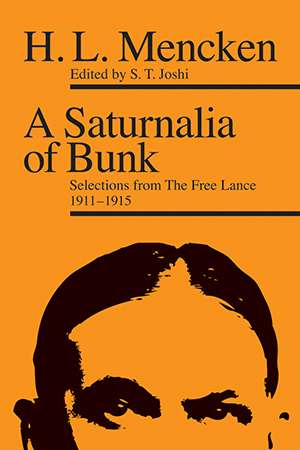'My Plan Is to Let People Do Whatever They Please'
The daily newspaper columns of H.L. Mencken

A Saturnalia of Bunk: Selections from the Free Lance, 1911–1915, by H.L. Mencken, edited by S.T. Joshi, Ohio University Press, 259 pages, $49.95

Oh, that H.L. Mencken were alive today!
You don't hear that wistful resurrectionary sentiment voiced much anymore. A modern newspaper columnist writing in Mencken's gleeful style, with its joyful savagery, its jocose sesquipedalianism, its sheer delight in the American language, would be met with astonished horror on the order of Henry James watching a Sam Kinison video or Robby Mook meeting a man who owns a pickup truck. (I should warn you that one cannot write about Mencken without aping him, however clumsily.)
The longtime Baltimore Evening Sun columnist, American Mercury editor, and rumbustiously splenetic critic, who graced this orb from 1880 to 1956, would not be published in any major newspaper today. The reasons he foresaw over a century ago, when he decried the "cheap bullying and cheaper moralizing" whose purpose was the extirpation, the annihilation, of anything resembling a robust exchange of ideas. Two beliefs puffed up the righteous censor, according to Mencken: first, "that any man who dissents from the prevailing platitudes is a hireling of the devil," and second, "that he should be silenced and destroyed forthwith. Down with free speech; up with the uplift!"
Plus ça change and all that.
S.T. Joshi, who has chosen his primary scholarly interests—Mencken, H.P. Lovecraft, and Ambrose Bierce—with a fine eye for readability over reputation, has assembled a selection of Mencken's Evening Sun "Free Lance" columns of 1911–1915 into a book called A Saturnalia of Bunk and contributed an informative introduction to it.
Henry Louis Mencken churned out six of these 1,200-word meringues every week, a vertiginous pace that makes Joyce Carol Oates look like Harper Lee.
Logorrheic bloggers aside, does anyone really have that much to say about the controversies of the day? Mencken once nicked Bierce for reprinting his early work, which was "filled with epigrams against frauds long dead and forgotten, and echoes of old and puerile newspaper controversies." Is A Saturnalia of Bunk similarly irrelevant?
Happily, no. Although Mencken's fusillades against, say, blue laws have grown fusty, his rousing conclusions—"the militant moralist tries to steal liberty and self-respect, and the man who has lost both is a man who has lost everything that separates a civilized freeman from a convict in a chain-gang"—have lost none of their punch.
These columns, composed while their author was on the shy side of middle age, afford, says Joshi, "a nearly complete view of Mencken's political, religious, social, and cultural philosophy as it had evolved up to this point"—and this philosophy would largely remain constant for the rest of his rooted life. (Mencken, a dyed-in-the-wool third-generation Baltimorean, a sardonic citizen of his place, made his home in the house in which he grew up.)
Mencken is in these columns and was until his death a libertarian, with the usual idiosyncratic departures from dogma of any red-blooded man. He puts it plainly: "My plan is to let people do whatever they please, so long as they do not invade the right and freedom of other persons to do the same."
He is, within the boundaries of his time and place, a free speech absolutist. Prohibitionists of all stripes—"snouters" and "absurd fanatics" who would ban alcohol, tobacco, prostitution, vivisection, and Sunday baseball—are pilloried with an outrage that is always anchored in an amused appreciation of the human condition, and never in hatred. No one defends fallen women, the "ladies of vermilion," with quite as much verve as Henry Mencken.
He is contemptuous of democracy, viewing it, Scrooge-like, as a poor excuse to pick another man's pocket. The common people, he says, "are always in favor of the man who promises to get something for them without cost to them—i.e., to steal something for them." To Mencken, democracy is the legitimization of envy, "an attempt to wreak punishment on successful men for the crime of being successful," and politicians are mendacious almost without exception. Yet in later years he covered political conventions with mischievous exuberance. He loved the spectacle, and conceded the American system "provides the only really amusing form of government ever endured by mankind."
On occasion he refers to racial, religious, and ethnic groups in what are meant to be humorous terms. But no editor of the 1920s was more encouraging to talented African-American writers than Mencken was; the last column he ever published, in November 1948, was a rousing denunciation of segregated tennis courts in Baltimore.
His columns as the Great War is breaking out in Europe are baldly pro-German, though he denies that this sympathy is an outgrowth of his own heritage. The kaiser's "German war machine" is a "means of defense only" against perfidious Albion. Biting the hand that fed him, Mencken dissented from the Evening Sun's pro-British line, and vigorously so, contrasting the "Germans with their homeric strength" with "the English with their white livers and their womanish screams for help," though he insists that "I regard the net English contribution to civilization as enormously greater than the German contribution."
His war writing is faintly ridiculous, bordering on parody, as Mencken stands in the long line of pontificators propagandizing for their co-ethnics in far-off conflicts that are none of America's business. At least he refrains from calling for U.S. intervention on the side of the kaiser.
Like ice cream or penicillin, Mencken is best taken in dollops and doses. Two hundred–plus pages of verbal assaults on flapdoodle, balderdash, mountebanks, yeggmen, hokum, and anthropoid paralogists can be wearying. His blithe certitude that "the more fit shall conquer and obliterate the less fit" is less than endearing. He writes, tongue quite out of cheek, that "war is a good thing because it is honest" and that a vigorous engagement therewith is restorative, since "a nation too long at peace becomes a sort of gigantic old maid." A Cheneyesque chicken-hawk couldn't have said it better. His political judgments were sometimes unduly harsh, and he could be supremely unfair to those with whom he disagreed, valuing the bon mot over the deeper understanding—witness his sulfurous nastiness to William Jennings Bryan.
But so what? Despite his superhuman output, Mencken was a man, not a god. (For Mencken's quarrel with the Almighty and His earthly interpreters, see the excellent D.G. Hart's recent Damning Words: The Life and Religious Times of H.L. Mencken.) His joie de vivre, his irrepressible good spirits, his lambent wit, his verbal winks while carving up some poor poltroon (which convey a message of, "Hey, we gave them a show of it—how about we adjourn to the tavern for a seidel or five?")—this is why Mencken is loved even by those who find his Nietzschean spasms off-putting, his anathemas overly broad.
We love him for his lexical flash (why say yellow when you can say xanthous?), but Mencken had substance as well as style. His description of a hanging—"the exitus of a gentleman of color"—is at once flat and clinical yet stark and repugnant, and a far more effective witness against capital punishment than the bleatings of a chorus of uplifters.
Mildly surprising columns in Joshi's collection tout the "unconquerable spirit" of the most militant woman suffragists and express admiration for the manliness of the more violent partisans of the Industrial Workers of the World.
And oh, the gnomes that run wild in Mr. Mencken's garden: "The surest way to make a given action attractive, indeed, is to prohibit it and put a penalty upon it," he writes in one essay. "Almost the only charm about smoking cigarettes, to the average healthy boy, lies in the assurance that he will be whaled if he is caught doing it."
There is also, in Mencken, a hint of self-mockery that is almost entirely absent from the commenting class. "I need not remind you," he once wrote, "how many misguided and fatuous persons there are in this town, State, republic, hemisphere, and world. You and I are fortunate in that we are not to be reckoned among them. Whatever we believe is true, and in most cases, self-evident." Only the man fully in command has the self-confidence to tease himself. Which is why the insecure twerps of the columnizing world are so often so damned serious.
Every libertarian should have a volume, or volumes, of Mencken on her shelf. Not as some obligation or adornment, but for the simple pleasure his prose brings.
This article originally appeared in print under the headline "'My Plan Is to Let People Do Whatever They Please'."


Show Comments (75)